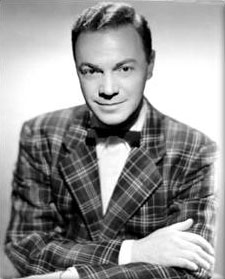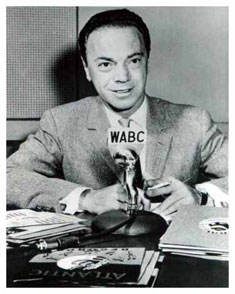
Perhaps the biggest hero in the story the Rock and Roll revolution was Alan Freed. Freed wasn’t a musician, but a disc jockey and promoter who earned the name “Father of Rock and Roll”. Keep in mind that rock was originally known as Race music or African-American Rhythm and Blues and was very rarely played on white radio. Freed wasn’t the first to play rock on the air, but he was a skilled promoter and by calling it Rock instead of Rhythm and Blues, and by playing mostly white covers of black songs. In doing so, he became a pioneer in racial integration at a time when segregation was rampant.
Originally known on the air at radio station WJW in Cleveland, Ohio, as “Moondog”, he set up what was probably the first rock and roll concert and called it “The Moondog Coronation Ball” on March 21, 1952. The event was attended by a racial mix which was unusual for the times. It drew a large crowd but had to be ended early due to overcrowding.
Later concerts were much more successful and continued to draw large mixed crowds. Within a few years, he moved to the big market in New York City where he turned WINS into a rock and roll radio station. Later, he would go on to record programming for Radio Luxembourg whose broadcast covered all of Eastern Europe. It’s interesting to picture The Beatles as youngsters listening to Freed’s show and playing along with the music.
More success followed, as Freed went on to star in several motion pictures featuring many of the new Rock Stars that he helped to create.

Television followed his movie success, but problems soon arose with the IRS, questions about royalties, and the Payola scandal. His series was cancelled, but interestingly, as Freed left television, the void that was created was filled by another DJ named Dick Clark.
The final blows to his career came as a result of the Payola investigation, when he was accused of accepting bribes for playing records, coupled with accusations that he had been given credit as a co-writer for some songs. As a co-writer, he was able to receive royalties, and this encouraged him to heavily promote the song. Chuck Berry’s Mabeline was a notable example cited.
Freed ended up pleading guilty to commercial bribery and was given a suspended sentence along with a fine. Although the punishment was relatively light, his tarnished reputation prevented the top stations from hiring him and interfered with his concert promotions. Alan Freed died young in 1965 before he was able to fully re-establish his reputation.
In 1978, the motion picture American Hot Wax was released, inspired by Freed’s contribution to the rock and roll scene, leading up to a concert that was held in New York City in 1959. In 1986, Freed was part of the first group inducted into the Rock and Roll Hall of Fame, which was built in Cleveland in recognition of his involvement in the birth of Rock. In 1988, he was also posthumously inducted into the Radio Hall of Fame and was later recognized by the Rockabilly Hall of Fame.